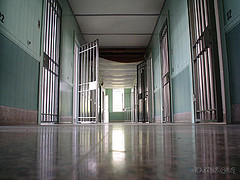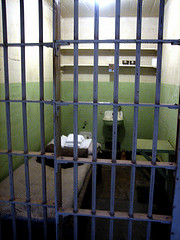What does the felony murder rule mean?

As you know, a felony is a crime that usually carries a sentence of more than a year in jail or prison. Examples of felonies include robbery, burglary, aggravated DUI, murder and sexual assaults.
Some states also have what is called a “felony murder” rule. This means you could be charged with murder if someone dies in the commission of an unrelated crime. The rule means that all involved in the commission of a felony are held equally responsible if a victim dies, even if you weren’t directly responsible for the death.

Photo by Laura Padgett
Let’s say you’re doing a beer-run with a friend. You’re driving the car and your friend runs into the store to steal a few six-packs. You’re waiting in the car with the engine running to make a quick getaway. Something goes wrong inside the store and your friend pulls out a gun and shoots and kills the clerk.
Since the initial act (robbery) is a felony and the clerk died as a result, the shooter will be charged with murder. Under the felony-murder rule, you as the driver can also be charged with murder even though you weren’t in the store and didn’t pull the trigger. The driver was part of the original crime that resulted in the death of the clerk.
The United States is one of a few Western countries that has the felony-murder rule. Michigan, Hawaii and Kentucky have done away with it and other states may do the same. Some argue that it violates the Eighth Amendment’s ban against cruel and unusual punishment.



To Sheri,
You should have gotten a lawyer before saying anything to the police. A similar thing happened to my underage son. The police were all polite and saying nothing would happen if he confessed. After he signed a confession they snickered and said that a felony is not expunged. He got two years probation. The other kid got a lawyer and copped a plea to a misdemeanor so his crime was expunged when he turned 18, my son still has a felony on his record.
Is it not true that if my friend and I were robbing a store and the clerk defended himself by shooting my friend, and he died I could be charged with felony murder? Even capital murder?
Dear Aimee: Some states have what is called a “felony-murder” law. That means if someone dies in the commission of a crime (like a robbery), everyone who participated in the act can be charged with the death of the victim. And it can be a capital offense depending on the specific laws in your state. Google “felony murder” and the name of the state where this happened for the specifics that would apply to your friend.
(This is information only – not legal advice).
Here is a good one. I have never had any experience with the juvenile justice system. My 15 yr-old son is a church going honor roll student who is compassionate towards others and can be trusted to make the right decisions.(and, obviously has never been in any trouble with the law) So imagine my shock when two officers showed up at my door telling me that my son had committed THREE Felonies the previous evening. He had lied to me about who he was with, gotten inebriated, and went with his friends as they burglarized three local businesses. The other two boys he was with are both seasoned criminals, and neither had told the police anything. (we did not know this at the time). The officers told my son that if he was honest and cooperative and told them everything, then they would put that in their police report, and given his lack of criminal history, the prosecutor probably would not even file charges or at the most my son could get “Diversion”? where he takes a class and stays out of trouble for a year and then charges are dropped. My son also made clear that he did not “break into” ANY of the three buildings, but he did enter the first building. He stated over and over to the officer that he DID NOT enter the other two buildings, just the first one. The officer also assured me that he would put that in his report. Caleb wrote everything down on a from for the officer, then the officer mirandized him and left. Six days later I get a letter from the Prosecuting Attorney’s office that my son is being formally charged with three counts of felony burglary in the 2nd degree. The other two kids had their parents lie and say they were at home so they are not being charged. What does this teach my son about being honest? What did he gain by telling the truth? And why did the officer tell me so many lies? I am really sorry this is so long but I am VERY frustrated. (and please lest anyone think I am making excuses for my son…he is grounded for 6 months, and I took his most precious posession-his phone,and he can only use the computer for schoolwork. And his $25 per week allowance is suspended until I find out how much this will cost me.)
Dear Sheri: Your son has learned that, regardless of what happens to the other boys, he told the truth and will live with the consequences and satisfaction that he did the right thing. If he considers the reasons the others weren’t charged, because their parents provided an alibi for them, he still knows the truth of the matter and can carry on with his life understanding that there are consequences for every action and that he, in confessing, acted admirably. The others have learned nothing from this other than the fact that they got away with it, this time. Once Caleb completes “diversion” he can apply for a clean record and eventually have this behind him. We’re sure, in the future, he will exercise caution in choosing who he hangs out with. Good luck.
[This is information only – not legal advice].
What would happen to me if I was doing a beer run with two others friends and they got caught as I was just walking around the store (carrying a 12 pack). They were outside when they got caught. So I put the 12 pack down and walked to my car. They had parked right next to me. In the store we said whats up to each other. Could anything happen to me?
Dear Daniel: Although it’s possible that you could also be charged with shoplifting since you don’t necessarily need to be out of the store with the stolen item in order to be cited or charged, it’s unlikely since it sounds like nothing happened to you that night. If your friends told the store employee that you were also involved, then it’s possible that the store would also hold you accountable, but without your contact information, there is no way for the store to contact you. We hope you learned through you and your friends’ mistake as you definitely go lucky this time. Good luck.
[This is information only – not legal advice.]
what happpens if i got cought shoplifting for the second time?
Dear Andi: That depends on your age, what happened the first time [was it diverted or were you found guilty by a court] and the amount involved the second time. You could be facing a period of probation with specific terms if you admit this one or if you go to trial on the charge and are found guilty. Consequences increase as you reoffend. Think before giving into temptation. Good luck.
[This is information only – not legal advice].
Dear Judge,
I know what murder means, but Murder NO FELONY?
Does this mean there is no/little sympathy for the victim.
Dear Ms. Hughes: Yes, that is what was meant in a case of murder with an umsympathetic victim due to his or her background, criminal history, etc. It is not an accepted legal term in regular use, just a description of an incident.
[This is information only – not legal advice].
What does the charge Murder no felony mean in Florida?
Dear Ms. Hughes: According to Wikipedia and a reported 2001 case, it is slang and refers to a case where there was little sympathy for the victim – a drug dealer and prostitute. In all jurisdictions to our knowledge, murder is a felony crime.
[This is information only – not legal advice].